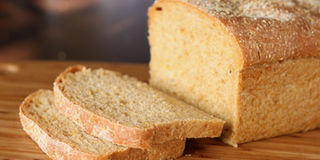Prime
What you should eat if you are iron deficient

Poor diet and the inability to absorb enough iron from foods, puts many people at high risk of becoming iron deficient. Full grain foods, eggs and liver are some of the good sources of iron.
What you need to know:
Iron is a mineral that the body needs for many functions. It is part of haemoglobin, a protein which carries oxygen from our lungs throughout our bodies. It helps our muscles store and use oxygen. Therefore, it is important that the body has enough of this mineral.
Every morning, Peter Kakuru used to wake up feeling tired. As days passed, he became weak and dizzy. He did not know what was wrong with him until he went to a clinic one evening.
The doctor carried out several tests and found out Kakuru lacked iron in his body. The doctor advised him to change his diet and eat beef at least once a week. Kakuru was also told to ensure his diet was balanced. Accompanied with some medication, he followed the doctor’s instructions, and soon, he was healthy again.
So what is iron deficiency?
Dr Alex Mutabazi, the in charge of quality services at AAR Health Services at Kololo, says iron deficiency is when the body lacks enough iron for blood formation. Iron combines with haemoglobin protein to form blood. Haemoglobin is a protein that is produced by the liver, and contains vitamin B1, which is essential in the absorption of iron.
Signs of iron deficiency
According to Dr Mutabazi, a person who lacks iron presents with symptoms such as body weakness, dizziness and headache.
He says when a person develops frequent body weakness, yet they have not engaged in any strenuous activity, it could be a sign that they lack iron in their body.
“When the body does not get enough iron, it becomes weak and blood formation becomes difficult,” he says. In some cases, iron deficiency may present in the form of palpitation, a condition in which a person can feel their heartbeat. “When the heart beats too fast yet you have not engaged in any intensive activity, it could mean that the heart is working harder than usual because of lack of iron. This could consequently result in iron-deficiency anaemia,” Dr Mutabazi explains.
What may cause iron deficiency?
There are several factors that could cause a person to be deficient in iron. Conditions such as cancer, malnutrition and presence of hookworms in the body and excessive consumption of alcohol are some of the contributing factors. “Cancer sucks a lot of iron and blood from the body, resulting in iron deficiency. On the other hand, if a person is malnourished, it means they are not getting enough food in their body, including those that provide iron,” says Dr Mutabazi. He adds that deworming regularly, washing hands before eating can reduce the risk of catching worms, which would have otherwise caused anaemia to the body.
While iron is crucial, too much of it may be dangerous for the body. Health experts say taking too many iron supplements can cause iron poisoning. Some people also have an inherited disease called hemochromatosis, which causes too much iron build-up in the body. Such people should avoid consuming foods with high iron.
Treatment for iron deficiency anaemia
Dr Mutabazi says people who have conditions such as cancer should feed on red meat because it is a good source of iron mineral. Besides meat, they should also consume high quantities of wheat, brown rice and millet, which are also high in iron minerals. For people who are malnourished, vitamin B or iron supplements are recommended to boost the haemoglobin or iron levels in the body.
WHO IS AT RISK?
•Women who loose blood during menstruation.
•Infants with low birth weight or those born prematurely and those who do not get enough iron through breast milk.
•People who do not eat meat (vegetarians) may also be prone to iron deficiency anaemia.
•Frequent blood donors may have an increased risk of iron deficiency anaemia, since donating blood can deplete iron stores. However, low haemoglobin related to blood donation is usually a temporary problem, which can be solved by eating foods that are rich in iron.
•Excessive alcohol use damages parietal cells and liver. Parietal cells help to absorb iron while the liver produces haemoglobin proteins that combine with iron to form blood. “When the cells are destroyed by alcohol, the body cannot absorb the iron consumed in red meat or grains,” Dr Mutabazi.




